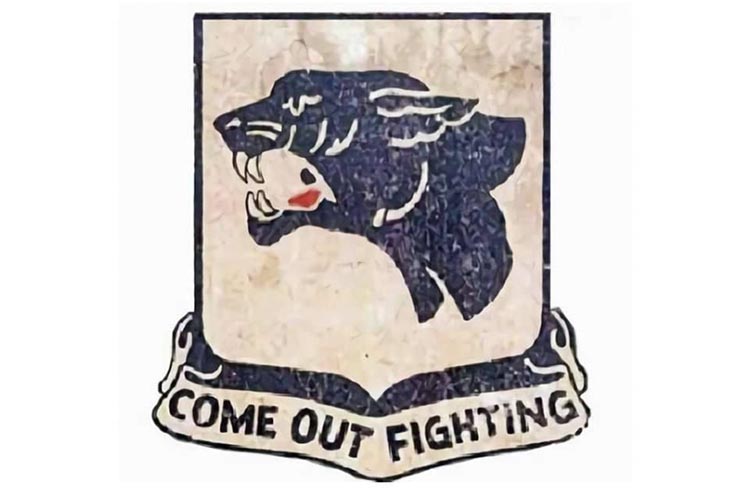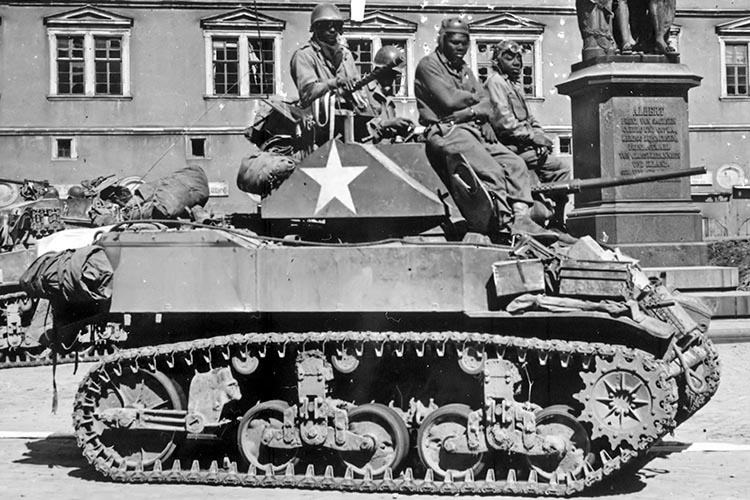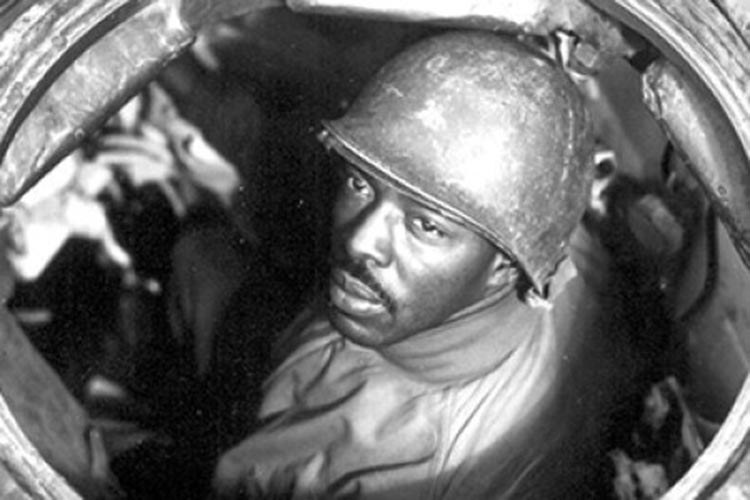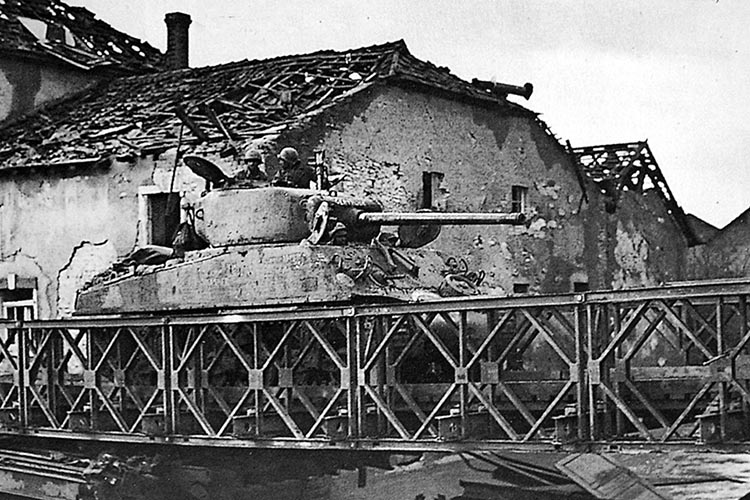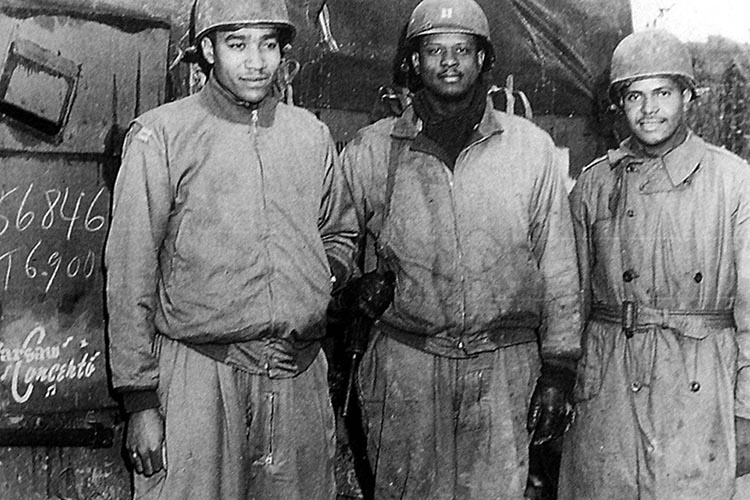How many of you out there have ever heard of the 761st Tank Battalion, called the " Black Panthers" of WWII? The African American men of the 761st Tank Battalion entered combat at Morville-les-Vic on November 7, 1944. In an "inferno" of battle, they proved their worth in the first of a series of hard fought battles. They were bada**es whose story has been mostly lost until now. Morgan Freeman has produced a new documentary on The History Channel called "761st Tank Battalion: The Original Black Panthers". It's now showing on The History Channel On-Demand.
The 761st Tank Battalion’s motto was “Come Out Fighting.” And that they did, from their first engagement at the little Belgian town of Morville-les-Vic in November 1944, through heavy combat at every Nazi hellscape on to the end of the war. But the 761st’s fight was not just against the Germans. As a segregated African American unit, it took part in the struggle for racial equality, a struggle in which the men of the 761st...the “Black Panthers,” would engage for the rest of their lives.
Established on April 1, 1942, at Camp Claiborne, Louisiana, the 761st Tank Battalion underwent training amidst the restrictions and pervasive racism of the Jim Crow South. They endured subpar accommodations and were subjected to segregation from their White counterparts. Their training was intentionally made longer and more rigorous, as military leadership unfortunately subscribed to the unjust stereotype that "negro" soldiers required constant supervision, thus the military brass had those from the South as their commanding officers. Incredibly, the prevailing belief at the time was that Black soldiers lacked the intelligence, judgment, stamina, or strength to serve on the frontlines, particularly when armed with guns and operating tanks. However, due to their unwavering determination, isolation, and rigorous training, the soldiers of the 761st Tank Battalion would go on to shatter these misconceptions and prove everyone wrong.
First Lieutenant Jack Roosevelt Robinson of the 761st, an athlete who would become one of the greatest baseball players of all time, lost his chance to see combat when he refused to move to the back of a segregated military bus during an incident at Fort Hood, Texas in July 1944. The 761st Tank Battalion’s commander, Lt. Col. Paul L. Bates, refused to prosecute Robinson, but his superiors got around that by transferring the lieutenant to another unit, where he was court-martialed. Robinson was later acquitted, but too late to rejoin the Black Panthers.
The 761st arrived in France on October 10, 1944, coming ashore at Omaha Beach and moving into Belgium at the beginning of November. General George S. Patton famously gave the Black Panthers a pep talk, saying in part: “Men, you're the first Negro tankers to ever fight in the American Army. I would never have asked for you if you weren't good. I have nothing but the best in my Army. I don't care what color you are as long as you go up there and kill those Kraut sons-of-bitches. Everyone has their eyes on you and is expecting great things from you. Most of all your race is looking forward to your success. Don't let them down and damn you, don't let me down!” Privately, however, Patton harbored the same doubts that many White officers had about Black soldiers, and he was reluctant to commit them to combat.
On November 7, 1944, the Black Panthers finally got their chance as they attacked the German-held town of Morville-les-Vic in support of the 26th Infantry Division. Many of their White senior officers were not present during this skirmish. Instead, the first thrust into the town was commanded by African American Capt. John D. Long of B Company, who followed behind the lead Sherman tank commanded by Sgt. Roy King. “I am sure my men thought I was a bastard and hated my guts but they followed me,” later recalled Long, a no-nonsense officer who hailed from Detroit. “They were a well-greased fighting machine.”
Right inside the town, King’s lead tank was knocked out by a German panzerfaust. Two of King’s crew were wounded; their comrades dragged them to safety behind the tank and then went on to kill the soldier with the panzerfaust and also the crew of a German anti-tank gun. King ran to the aid of a White infantryman and was wounded in the process but refused evacuation; he would be killed in action 12 days later. At the end of the battle in Morville-les-Vic, a German officer would tell Long that the conduct of King and his crew “was only equaled by that of a Russian tank crew under similar circumstances.”
Another tank commander, Staff Sgt. Ruben Rivers, encountered a German roadblock that forced his tank to a halt. Under heavy enemy small arms fire, he leaped out of the tank, attached a cable from his Sherman to the roadblock, remounted, and then had his tank pull the obstacle off the road, freeing the tank column to resume the advance and capture the town. Rivers would later receive the Silver Star for his conduct. Like King, however, Rivers would be killed in action several days later; his medal was sent to his family in Oklahoma posthumously.
The Black Panthers captured Morville-les-Vic on November 7th. Three days later, as the advance continued, Sgt. Warren Crecy's Sherman tank was disabled by a German anti-tank gun. Crecy promptly disembarked, assuming command of a machine gun mounted on a nearby American halftrack. With this weapon, he eliminated the enemy gun crew. On the subsequent day, while leading another tank, Crecy dismounted under fire once more when his vehicle became mired in the mud, working tirelessly to free it. During this ordeal, he noticed an enemy machine gun targeting the 26th Division infantry. Without hesitation, Crecy ascended to his turret-mounted machine gun and used it to suppress the enemy fire. Throughout the day, he employed the same gun on multiple occasions, repeatedly exposing himself to enemy fire as he neutralized German machine gun nests and an anti-tank gun. For his exceptional courage in the heat of battle, Sgt. Warren Crecy was awarded a Silver Star for gallantry in action.
Capt. Long proudly summed up his pride for the Black Panthers and their conduct. “Not for God and country but for me and my people,” he said. “This was my motivation pure and simple when I entered the army. I swore to myself there would never be a headline saying my men and I chickened. A soldier, in time of war, is supposed to accept the idea of dying. That’s what he’s there for; live with it and forget it. I expected to get killed, but whatever happened, I was determined to die an officer and a gentleman. . . . The town of Morville-les-Vic was supposed to be a snap but it was an inferno; my men were tigers, they fought like seasoned veterans. We got our lumps but we took that f***ing town.”
#761STTANKBATTALION #WWII #BlackSoldiers #TheHistoryChannel #MorganFreeman #BlackPanthers #BlackHistory #AmericanHistory #Army #BlackFacts #MPJINews


